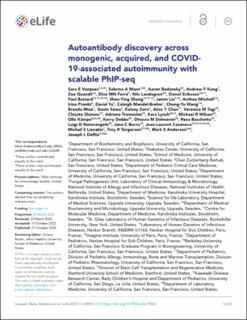Autoantibody discovery across monogenic, acquired, and COVID-19-associated autoimmunity with scalable PhIP-seq
| dc.contributor.author | Vazquez, Sara E. | |
| dc.contributor.author | Mann, Sabrina A. | |
| dc.contributor.author | Bodansky, Aaron | |
| dc.contributor.author | Kung, Andrew F. | |
| dc.contributor.author | Quandt, Zoe | |
| dc.contributor.author | Ferré, Elise M N | |
| dc.contributor.author | Landegren, Nils | |
| dc.contributor.author | Eriksson, Daniel | |
| dc.contributor.author | Bastard, Paul | |
| dc.contributor.author | Zhang, Shen-Ying | |
| dc.contributor.author | Liu, Jamin | |
| dc.contributor.author | Mitchell, Anthea | |
| dc.contributor.author | Proekt, Irina | |
| dc.contributor.author | Yu, David | |
| dc.contributor.author | Mandel-Brehm, Caleigh | |
| dc.contributor.author | Wang, Chung-Yu | |
| dc.contributor.author | Miao, Brenda | |
| dc.contributor.author | Sowa, Gavin | |
| dc.contributor.author | Zorn, Kelsey | |
| dc.contributor.author | Chan, Alice Y. | |
| dc.contributor.author | Tagi, Veronica M. | |
| dc.contributor.author | Shimizu, Chisato | |
| dc.contributor.author | Tremoulet, Adriana | |
| dc.contributor.author | Lynch, Kara | |
| dc.contributor.author | Wilson, Michael R. | |
| dc.contributor.author | Kämpe, Olle | |
| dc.contributor.author | Dobbs, Kerry | |
| dc.contributor.author | Delmonte, Ottavia M. | |
| dc.contributor.author | Bacchetta, Rosa | |
| dc.contributor.author | Notarangelo, Luigi D. | |
| dc.contributor.author | Burns, Jane C. | |
| dc.contributor.author | Casanova, Jean-Laurent | |
| dc.contributor.author | Lionakis, Michail S. | |
| dc.contributor.author | Torgerson, Troy R. | |
| dc.contributor.author | Anderson, Mark S. | |
| dc.contributor.author | DeRisi, Joseph L. | |
| dc.date.accessioned | 2022-12-23T09:45:19Z | |
| dc.date.available | 2022-12-23T09:45:19Z | |
| dc.date.created | 2022-12-16T14:58:41Z | |
| dc.date.issued | 2022 | |
| dc.identifier.issn | 2050-084X | |
| dc.identifier.uri | https://hdl.handle.net/11250/3039348 | |
| dc.description.abstract | Phage immunoprecipitation sequencing (PhIP-seq) allows for unbiased, proteome-wide autoantibody discovery across a variety of disease settings, with identification of disease-specific autoantigens providing new insight into previously poorly understood forms of immune dysregulation. Despite several successful implementations of PhIP-seq for autoantigen discovery, including our previous work (Vazquez et al., 2020), current protocols are inherently difficult to scale to accommodate large cohorts of cases and importantly, healthy controls. Here, we develop and validate a high throughput extension of PhIP-seq in various etiologies of autoimmune and inflammatory diseases, including APS1, IPEX, RAG1/2 deficiency, Kawasaki disease (KD), multisystem inflammatory syndrome in children (MIS-C), and finally, mild and severe forms of COVID-19. We demonstrate that these scaled datasets enable machine-learning approaches that result in robust prediction of disease status, as well as the ability to detect both known and novel autoantigens, such as prodynorphin (PDYN) in APS1 patients, and intestinally expressed proteins BEST4 and BTNL8 in IPEX patients. Remarkably, BEST4 antibodies were also found in two patients with RAG1/2 deficiency, one of whom had very early onset IBD. Scaled PhIP-seq examination of both MIS-C and KD demonstrated rare, overlapping antigens, including CGNL1, as well as several strongly enriched putative pneumonia-associated antigens in severe COVID-19, including the endosomal protein EEA1. Together, scaled PhIP-seq provides a valuable tool for broadly assessing both rare and common autoantigen overlap between autoimmune diseases of varying origins and etiologies. | en_US |
| dc.language.iso | eng | en_US |
| dc.publisher | eLife | en_US |
| dc.rights | CC0 1.0 Universal (CC0 1.0) Public Domain Dedication | * |
| dc.rights.uri | http://creativecommons.org/publicdomain/zero/1.0/ | * |
| dc.title | Autoantibody discovery across monogenic, acquired, and COVID-19-associated autoimmunity with scalable PhIP-seq | en_US |
| dc.type | Journal article | en_US |
| dc.type | Peer reviewed | en_US |
| dc.description.version | publishedVersion | en_US |
| dc.rights.holder | Copyright 2022 The Author(s) | en_US |
| dc.source.articlenumber | e78550 | en_US |
| cristin.ispublished | true | |
| cristin.fulltext | original | |
| cristin.qualitycode | 2 | |
| dc.identifier.doi | 10.7554/eLife.78550 | |
| dc.identifier.cristin | 2094525 | |
| dc.source.journal | eLIFE | en_US |
| dc.identifier.citation | eLIFE. 2022, 11, e78550. | en_US |
| dc.source.volume | 11 | en_US |
Tilhørende fil(er)
Denne innførselen finnes i følgende samling(er)
-
Department of Clinical Science [2310]
-
Registrations from Cristin [9676]

